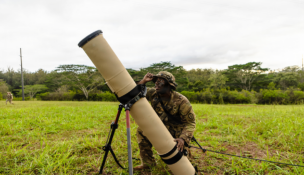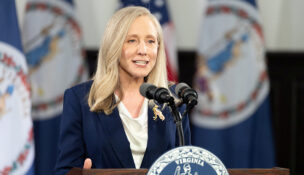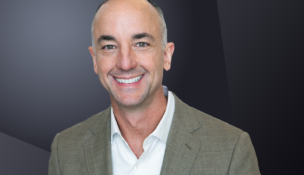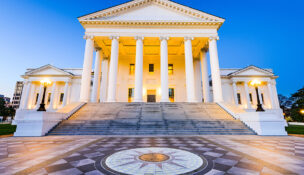Seeking common ground
McAuliffe navigates relationships with Republican legislators
Seeking common ground
McAuliffe navigates relationships with Republican legislators
It’s a new era in Virginia politics. Since the close of a bitter, divisive election, Gov.-elect Terry McAuliffe has been searching for common ground with his Republican counterparts.
McAuliffe’s election means a Democrat will return to the Executive Mansion after four years. To accomplish his goals, McAuliffe must work with a Republican super majority in the House of Delegates and a fairly evenly divided Senate. (Control of the Senate, which has been evenly divided for the last two years, will depend on the outcome of special elections.)
McAuliffe will need to nurture these relationships to make progress on issues such as education, ethics reform and the expansion of Medicaid.
The governor-elect doesn’t seem deterred by the challenge: “The one theme you will hear over and over again from me for the next four years is, ‘Where is the common ground?’” says McAuliffe. “When I’ve reached out to the Republican legislators, I’ve started every conversation, ‘Where can we agree? What are the things that we agree on? Let’s get the things done that we can agree on.’”
Virginia Business spoke with the governor-elect in early December on a range of topics, including sequestration, transportation funding, ethics reform and the expansion of Medicaid.
Virginia Business: It was a huge coup for the General Assembly and [Gov. Bob] McDonnell with the new transportation funding that was passed. Do you have similar or different ideas on exactly how that money should be spent?
Terry McAuliffe: I would say I first applaud Governor McDonnell and the bipartisan coalition of legislators who worked so hard to make the first real investment in transportation funding in 27 years. Their efforts proved it’s still possible to put partisan battles aside, find common ground and do what’s right for Virginia’s families and businesses.
As governor, I will be a responsible steward of the investments that this package makes by choosing the right projects for our economy and making sure they are completed on time and on budget. I have always said, for me in transportation funding, the project, (a) has to ease congestion, (b) have an economic development component and (c) have some local input into how these projects are done. I strongly support public-private partnership as a strategy to attract investments and projects that would not get done otherwise. The key to negotiating those partnerships, we need to do it in a way that moves the project forward but has to provide a good deal for the taxpayers.
VB: For any of the public-private partnerships, such as [U.S.] 460 or the Midtown and Downtown tunnels, are there any changes you’re going to consider for those?
McAuliffe: I’ve talked a lot in the campaign about the Portsmouth tolls [on the Midtown and Downtown tunnels.] I’ve consistently said those tolls are too high. I have nominated Aubrey Layne to be the secretary of transportation. Aubrey and I have sat down to discuss this to try and come up with some creative ways to … deal with that issue.
VB: What types of changes to ethics reform do you think you’d support? How do we ensure we find the right balance of having mechanisms to combat corruption but not punish innocent behavior?
McAuliffe: Since the election, as promised, I have reached out to every Republican in the General Assembly. The conversations that I’ve had with both sides of the aisle in the General Assembly is that we are going to be able to get an ethics reform package agenda done. I have said it’s important that we place a limit on the gifts that public officials can receive. We need to increase penalties for violating our ethics laws. We need to establish an independent ethics panel to hold us all accountable.
As we begin that process, I intend to act independently and set a new standard for transparency and accountability in my own administration. I am going to immediately sign an executive order that will place a $100 gift [limit] on myself, my family and members of the executive branch. I want to make sure that we are not punishing innocent behavior, but we should always come down on the side of eliminating the potential for conflicts of interest.
VB: On Medicaid expansion, since the [Medicaid Innovation and Reform Commission] hasn’t come to a conclusion yet, what are your plans on moving forward?
McAuliffe: [Expanding Medicaid] would help create jobs, grow our economy and make life better for all Virginia families. It will help 400,000 Virginians get access to quality health coverage. It will create up to 30,000 new jobs, and it’s going to be $21 billion of Virginia taxpayer dollars [coming] back to Virginia. I’ve always said this is the right thing to do, but it’s also smart business. We should not allow our hard-earned tax dollars to go to other states to make their citizens healthy and more economically competitive with us…
The issue is absolutely critical to the business community in several ways. We have a world-class workforce, but we’re going to struggle to compete with other states as long as 1 million Virginians do not have health insurance. There’s also a real danger for Virginia’s hospitals and health providers as our federal [Medicaid Disproportionate Share Hospital, or DSH] payments decline under the presumption that we’re going to expand Medicaid to offset them …
And if we don’t take the Medicaid expansion and these federal DSH payments go away, somebody is going to pay the cost of that increased health care, and it’s going to come to the business community. Businesses are going to end up having to pay for that with increased premiums for health coverage, while our money is going to help citizens in other states.
This is a very important issue … but I’m optimistic that we can continue to discuss this issue and find common ground that makes sense for all Virginians.
This is going to be a long process. I want it to work. I want to use the health-care expansion to make our health care more cost effective. We’ve [got to find a] way to do this to bring our money back to us, create jobs, provide for our citizens and do it in a way that … we’re not bringing an undue financial burden to the commonwealth.
VB: Would you be supportive of an option similar to what Arkansas has done [by paying premiums for private health insurance rather than expanding Medicaid]?
McAuliffe: Yeah. And I’ve said that I’m open to looking at all options. I have been an entrepreneur my whole life. I go into negotiations, and I have never taken anything off the table. Let’s have a good, healthy discussion. This is what democracy is all about. And let’s get to a place where we have common ground. The one theme you will hear over and over again from me for the next four years, “Where is the common ground?”
When I’ve reached out to the Republican legislators I’ve started every conversation, “Where can we agree? What are the things that we agree on?” Let’s get the things done that we can agree on, and I want to do the same thing as it relates to the Medicaid expansion. This should not be an ideological, partisan battle. This should be about what’s in the best interest of Virginia families and businesses and can we do this in a manner that we’re helping everyone.
VB: In looking at economic development, you are one of the few governors who has had experience with economic development from a businessperson’s standpoint. How do you think you’ll shape economic development?
McAuliffe: Since the day I was elected, I’ve made calls around the country, around the globe. I’m going to be very aggressive, very engaged …
We have phenomenal assets in Virginia from a business perspective. We have a world-class workforce, we’ve got a great education system, and now the [commonwealth is getting] resources we need to improve and expand our transportation infrastructure. So you think of the universities and colleges that we have. We have the deepest port on the East Coast. We have Dulles International Airport. We’ve got the ocean. We’ve got mountains. We’ve got all the tools that we need. We’ve got 23 great community colleges, which are real engines for workforce development …
I’m eager to get to work on day one promoting all of our assets. I’m going to focus my efforts on making Virginia the leading competitor for every economic development project that would be a good fit for the commonwealth. I want to pursue an agenda that will continue to make us more attractive to job creators all over the globe. You don’t always get everything you want, but you know what? You’ve got to be in that arena trying. And I’m going to be trying.
VB: For pre-K, that’s been a big issue for the business community. So is it just you want to expand access even more? What’s your focus going to be there?
McAuliffe: I’d like to see it so we have access to all Virginians. We should do it the Virginia way, and that doesn’t mean it’s the commonwealth’s responsibility, and the state has to spend all the money or even close to that. We should do it in a way where we work with many of our local community groups, our faith groups, public and private partners. Eighty percent of the brain is developed between birth and three years old. Let’s not pick winners and losers at birth, let’s not determine who gets pre-K early childhood development depending on their ZIP code or parents’ income. This is important to build a workforce for the 21st century, and it starts at birth. We need to do everything we can working with local communities and faith groups and community-based organizations in the state…all of us working together in a bipartisan common sense way to make sure that we are offering pre-K, early childhood development to as many Virginians as we possibly can.
VB: How do you think we need to deal with the effects of sequestration?
McAuliffe: We are the top recipient of federal dollars in the country. You know that relationship has resulted in great prosperity in Virginia, but it also exposes us to the uncertainty that’s going on now in Washington gridlock and the effects of damaging cuts like those that are contained within sequestration.
My key goal, my top responsibility as governor, is to diversify our economy so we can continue to grow and create jobs in sectors that are a little less dependent on the federal government. That will be a top priority. Jobs of the future are being created in fields like health care, biosciences, cybersecurity, data management and alternative energy.
These are the industries that are going to offer real opportunity to lead the economy of the 21st century and bringing them here and helping us insulate from sequestration and the continued uncertainty and partisan gridlock that we have in Washington is the top priority.
r

















